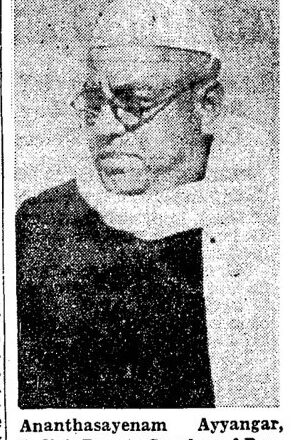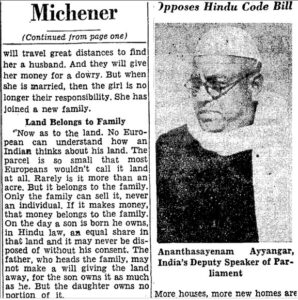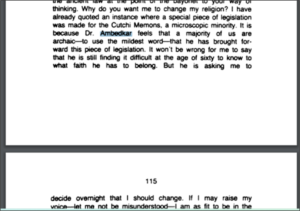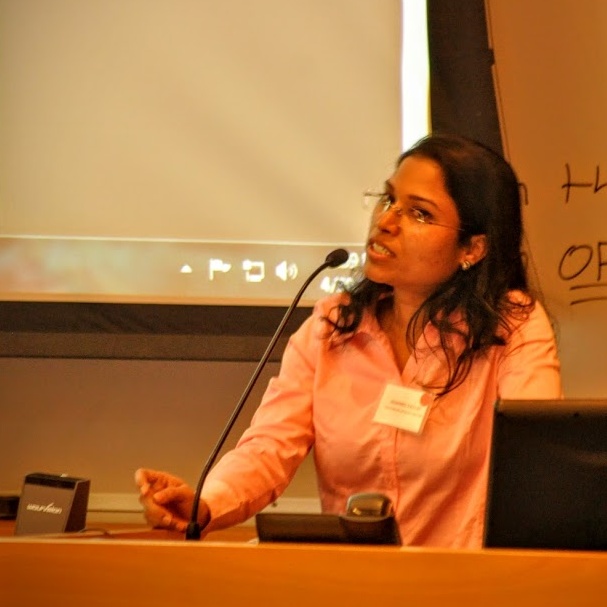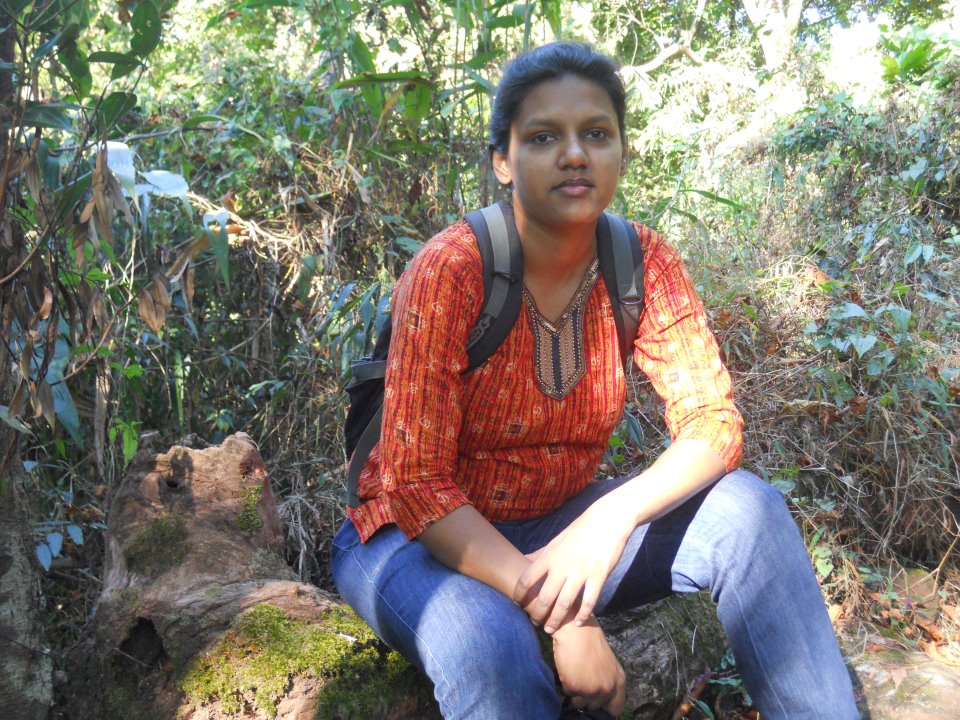Anu Ramdas
A question that persists in my mind: why don’t Indian feminists take an academic or personal or a feminist interest in studying men and women from their own families, castes and class?
They are ever ready to be experts on the lower castes. Take a look at the number of brahmin women academics publishing and holding forth on Dr Ambedkar or anti-caste movements — why don’t they use their massive institutional resources to develop critical scholarship on men like Ananthasayanam Ayyangar, the first deputy speaker in the parliament? His documented views provide more material than all the caste and gender studies’ productivity which churn out fake theories on patriarchy. They are relentless in keeping the focus away from the men at the top of the Indian society’s power structures. Why is there not even one feminist or sociological inquiry into the views of people such as Mr. Ayyangar, people who govern their lives as well as everyone else’s from their perpetual apex position in the Indian society?
On the other hand, it has become fashionable to have symbolic representation of Babasaheb Ambedkar in all kinds of discourses and narratives – a tactic that anyone can adopt. It must be harder to reconstruct what he was dealing with while attempting social change: a room full of Ayyangars, and their determination to uphold their ‘ancient’ Brahmin belief system.
Since the Indian feminists have their heads buried in the sand, Savari can occasionally give them a helping hand by providing them material about their own history, on the patriarchy of brahmin men – immediate and ancestral. Perhaps they would begin their journey to humanize themselves.
Here is an interview of Mr. Ayyangar that appeared in the New York Herald Tribune in 1951. He provides the apex patriarch’s – the brahmin male’s worldview on the position of women, their rights and role in the family and the new nation.
~~~
Opponent of Hindu Code Bill Says It Would Wreck Family Life, Break Up Farms, Ruin India
Deputy Speaker of Parliament Ananthasayenam Ayyangar is against the Hindu Code Bill. This fifty-year-old Bombay lawyer doesn’t hedge. He’s against the bill. He says it will ruin India.
In fact, Mr. Ayyangar is so irrevocably opposed to the code that he needed no questions from me to keep the discussion going. He anticipated all of my arguments and gave an excellent example of a powerful and logical mind in action.
“To understand the Hindu Code Bill,” he said, emphasizing his points as if he were addressing a jury, “you must remember two things, India is terribly poor. And in order to combat poverty we long ago invented the joint family. These ideas are basic to Indian life, and the joint family is the unit for all life.
“Such a family consists of a man, his wife, his sons, his sons’ wives and their children, and if need be, the man’s own parents when they are too old to work. The joint family is India, and anything that threatens it is evil and must be opposed.
“The joint family lives on its little plot of land, growing its rice, sharing its poverty. It is more than a family. It is the social legislation of India. We have no federal unemployment compensation, for the family insures that. We have no old-age pensions, because the family takes care of that. We have few orphanages for the family keeps all children. Every proposed Indian law can be judged by one question alone: Is it good for the family? If not, then it must be bad for India.
“Now as to girls. Girl children are part of the family until they marry. Then they become part of their husband’s family and they are cut off from their original family as completely as if they had died. They do not look to their mother for guidance, but to their husband’s mother. They do not ask their brothers for clothes, they ask their husband. They are of his family now and forever, and it becomes the responsibility of his family to provide for her, to care for her children, to feed her in her old age.
“That is why there are no unmarried women in India, A father and his sons, worried about a girl’s future, work very hard to get her married early and settled securely. They will pay much money to accomplish this. If necessary, they will travel great distances to find her a husband. And they will give her money for dowry. But when she is married, then the girl is no longer their responsibility. She has joined a new family.
Land Belongs to Family
“Now as to the land. No European can understand how an Indian thinks about his land. The parcel is so small that most Europeans wouldn’t call it land at all. Rarely is it more than an acre. But it belongs to the family. Only the family can sell it, never an individual. If it makes money that money belongs to the family. On the day a son is born he owns, in Hindu law, an equal share in that land and it may never be disposed of without his consent. The father, who is the head of the family, may not make a will giving the land away, for the son owns it as much as he. But the daughter owns no portion of it.
“And if a man has five sons then he must take them into considerations. By law he must give each son an equal share in the family wealth. But if he has five daughters then he alone owns the land the daughters must look to their husbands for land.
“Now you can see what a horrible thing the Hindu Code Bill is. It says that in addition to the ancient rights of the sons in family property, the father must in addition consider his daughters. Thus the wealth of India will be broken down into smaller and smaller pieces. And soon this great land will be totally ruined.
Calls Bill “National Suicide”
“Now consider the land. If you have seen an Indian rice paddy you know that individual fields are already so small they barely be farmed. We are starving for lack of rice. But the code says that these tiny fields must be fragmented further. It’s national suicide.
“So if a man has no objections to the code other than this attack on the joint family, the code should be defeated. Actually there are other more serious objections”
Mr. Ayyangar now draws his legs up under him and leans forward from his chair. At first it looks as if he might teeter off, but he raises his right forefinger dramatically and launches into a legal annihilation of the bill.
“First the women who are shouting for this code want it mainly for one reason. So they can get hold of a little hard money and leave the villages. They want to live in big cities like Western girls. They don’t want to marry early and become part of Indian life. They want to get away from family supervision. We are asked to ruin India for such selfishness.
Second, the divorce clause in the code will have a disastrous effect on Indian life. Oh, the woman will get her divorce all right, but then what? No Hindu man will marry her. There is in our religion an absolute repugnance against association with another man’s wife. An orthodox Hindu won’t even shake hands with a married woman. What will these divorced women do? If they have no money, they will be able only to drift into the big cities.
Sees Wives Leaving Families
“Third, if a young wife enters her husband’s family bringing along some money on her own it won’t be long before she’ll want to establish a home of her own. To get away from her mother-in-law. But where will she find a house? There aren’t enough to go around now, when we have joint families. Or where will she find the land on which to build her home? It’s all being used now. More houses, more new homes are an impossibility.
“Fourth, if you weaken the joint family you speed the day when Communism will succeed in India. If you build up a landless wandering population, India is lost.
“Fifth, there is another point you may not understand. Please don’t take offense. The Hindu Code Bill is called modern because it will bring India in line with Western customs. Why should we be brought in line? What is there about Western social life that is so impressive? Are all girls in New York married? Are old people looked after in your country? Tell me, which better, to give a girl a typewriter or a home?
“Sixth, the Hindu Code is going to make an impermanent India, whereas under our old custom, India has become the most ancient continuing society in the world. India has withstood a hundred assaults. The Aryans invaded us and we absorbed them. The Moslems came, and our joint family withstood the shock. The English came and we outlasted them. Our marvelous family system has never been weakened from without. But now we are asked to destroy it from within.
“We Indians don’t want Western divorce, Western girls roaming around unmarried and unhappy children in Western orphanages. Above all, we don’t want our aged thrown into the street when they reach sixty. If you have joint family, one extra mouth is no burden. But if you have to pay for that person’s room and board it becomes something to be avoided. Do you think America’s way with old people is better than India’s?
“Finally, the Hindu Code Bill is an attack upon an ancient gentle religion. Hinduism is the oldest successful religion on earth. Like the joint family that goes with it, Hinduism has withstood attacks for five thousand years. It is the very structure of our society. If a proposed code threatens that structure, then it ought to be fought and fought and fought. That is what I am going to do.
New York Herald Tribune, 1951
~~
His speech in the parliament on the codification of the Hindu law gives many more insights into the opposition building against the bill. Here is a short section when he refers to Dr Ambedkar.
This gentleman is only 2 generations removed from the present. This interview should prompt some basic questions such as: have the class of male descendants of such men changed? Have the class of female descendants ever resisted? What has changed or if they are dutifully carrying out duties prescribed by their ancestors?
